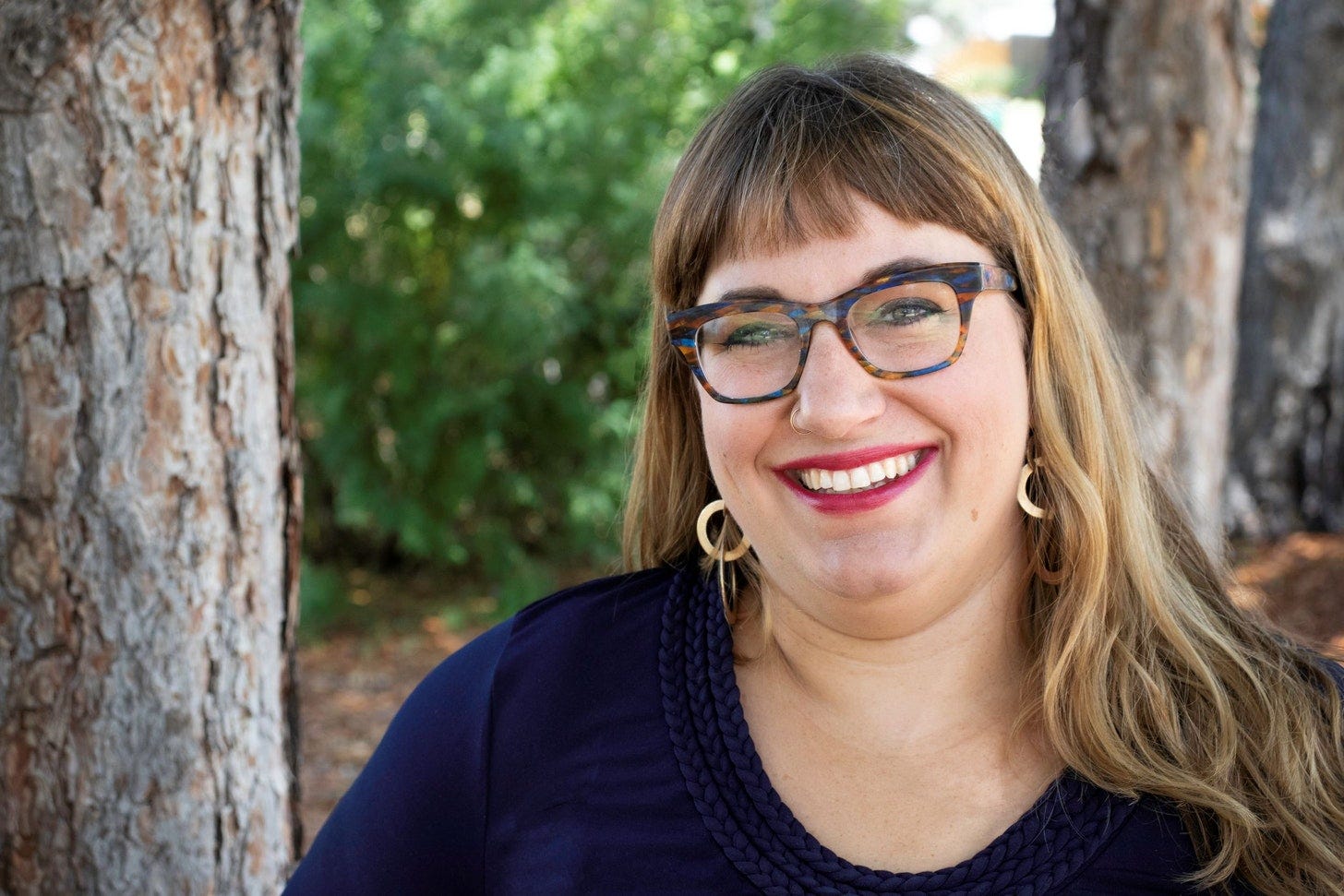the Empathy List #87: Parenting Through Deconstruction
What do you tell your kids about God when your beliefs change?
If you enjoy my email, would you forward it to a friend?
Hello friend, Liz here.
A long-distance friend asked me a question I’ve been pondering for weeks now:
she asked, “I know you’re deconstructing, but what do you tell your kids about God now?”
She and her husband felt stuck, not knowing what it meant to lead kids toward faith in a healthy—rather than shaming or controlling—way.
The idea is compelling, but I think more compelling to me because the past few months have been ALL ABOUT my kids. Summertime limits my writing and speaking and posting capabilities in helpful and enraging ways.
I spend the majority of my time carting around bathing-suit clad children to various birthday parties, camps, lessons, and activities for three unrelenting months. I also manage TWO large gardens (one for a job, one for fun in my own backyard, supposedly…. ;-)), and that’s had its own long chore list to accomplish weekly, including many activities that would count toward a Crossfit workout.
I guess it’s fair to say that I’m very tired and very relieved that school has started up again here in Denver, Colorado. I enjoy my elementary-schoolers so much when they’re not sneaking punches at each other behind my back…
Anyway, how to talk about God to my kids feels like an increasingly relevant question for me.
My kids have now reached the age of loud opinions about God, and they tend to make these spiritual decisions on factors that vary from minute to minute and usually have nothing to do with God anyway, such as:
-the kinds of snacks served or the seating arrangements offered in Sunday school;
-their stubborn attachment to a three-days-old outfit that mom won’t let them wear to church (because grosssss);
-the opposite opinion of their sibling;
-the weather patterns, whatever those might be.
Which is to say, I hold my kids’ expressed opinions about God loosely. ;-) Of course their views are changing by the second alongside their small bodies.
Tell me, how do you talk to your kids about God?
But as I’ve considered this question, I find that I am much less worried about what I tell my children about God.
This doesn’t mean I’m telling them nothing. We read the Jesus Storybook Bible together, we pray in the car on the way to school most mornings, we talk about God and church and the Bible all the time, as it occurs within our living.
However, at this point in my parenting journey, I feel less concerned about which theology I express explicitly to our children than I do the theology that I imply.
Here’s why: I once heard someone say that a child’s view of God crystallizes by age 5.*
(*Side note: I cannot, for the life of me, find the owner of this quotation. I’ve google searched til I’m blue without success. If you know it, can you pass the attribution along? I’d really like to verify it and learn more, as I’m hoping there’s some research to back up this gorgeous claim!)
What I love about this idea is that five-year-olds cannot read. Their minds have not shifted in the ways we know written language changes the anatomy of the brain. That means, very literally, that young children cannot fathom the big ideas we’ve come to associate with Christianity—those big T theologies that shape our big T thinking about God.
Yet they form belief systems anyway. So what do young children possess that can help them understand God so clearly?
Imagine you’re three feet from the ground. You look up and what do you see? Your parents, of course. You see the grownups all around you who, by their height alone, appear godlike, at least from your vantage point.
All you can do, as a five-year-old, to measure the nature of God is to observe closely those godlike figures in your closest vicinity. How they relate to you teaches you more about God than any book or expressed teaching would.
Because we cannot separate God from our caregivers, we measure God by the model set by our caregivers as well.
So, for example, I might wonder, is God willing to bend onto God’s knees to meet me at eye level? Does God feel threatened by my big toddler feelings? Does God make time to play duplos with me on the carpet, unhurried and content just to be with me? Does God hold me, feed me, swaddle me? Does God even notice me down here at God’s feet?
As a therapist will tell you, these observations continues to inform our deepest knowledge of God into adulthood.
How our parents respond to these questions teaches us God’s response to these questions—whether correct to our capital T theology or not. Whether we get it right about God doesn’t really measure up to the power of these subconscious teachings about God. Our parents imprint God on us by their actions, whether that matches their spoken beliefs or not. The lived expression always wins out.
So when I feel overwhelmed or afraid that my kids might not receive a seminary-level theology education from living in my house, I am comforted by the fact that the best way I can teach them about God is to model God’s nature to them in my interactions with them.
(And then to make it clear to our kids by REPENTING without exception when my actions do NOT mirror God. Constant repentance is the key to healthy relationships in our household.)
As you might guess, this is actually a MUCH HARDER way to parent than spouting off a list of moral priorities… but it’s the way us humans actually learn best. We need to see to believe.
In the meantime, I’ll be over here wiping countertops and walking kids through their math homework, hoping that it’ll add up to something much bigger and more beautiful than I could bring about in all my striving.
Isn’t that just another name for a miracle?
Warmly, Liz Charlotte Grant
Some Announcements…
The podcast trailer for the Zealot podcast is nearly here. I can’t wait to share it!!

I’ve hired a contract copy-editor/social media freelancer. Thanks to those who threw their names in the hat! I hope to connect with you in other ways in the future. :)
Curious Reads
#1
The only good thing about flying in an airplane? The guilt-free luxury of seat-back airplane movies. —The Atlantic
#2
Serena Williams is equal parts tennis star and fashion icon. She recently announced she was retiring from tennis… but not from fashion. Here, she looks back on her most iconic looks across her sports career. —Vogue
#3
“What’s a black hole and why do we care what happens inside?
Is there life in the universe? And if there’s life in the universe, how come we don’t already know about it?
What’s the fate of the Earth in the universe? Are there other universes? Do we have free will? Are there any good movies about science? Will we ever live on Mars? Why do we remember the past and not the future?
And then, did God have any choice creating the universe? That was Einstein’s question.”
Black holes, time flattening, and astronomy… oh, my! I felt so inspired listening to this episode on the biggest cosmic questions that science is trying to answer. —The Daily podcast from the New York Times
#4
All about Twittergate and the whistleblower who started it. —Slate
#5
Reeling from a tough round of dating rejections? You’re in a flop era. Having trouble making rent? You’re in your Dickensian era. Needing to feel self-important? Declare a new era in your life has begun.
“What does it mean to be entering an era? It’s a way of taking ownership of your own story, even (especially) the messy parts. You’re slamming the door on one chapter of your life and emphatically striding into the next. You decide an era has begun and therefore you are in it. Your declaration makes it so.”
Read about the trend of creating individualized “eras” on social media. ;-)
Just for fun…
An alternative, more politically-minded idea for that side-walk lemonade stand (from the New Yorker).








I love this idea that we model God and in so doing, teaching theology! What a comfort!
I do not have children but I found this piece fascinating. It makes me think about some of the stuff I have been reading about attachment and how our attachment to our primary caregivers has implications for the way we experience God. I wonder would these things overlap?